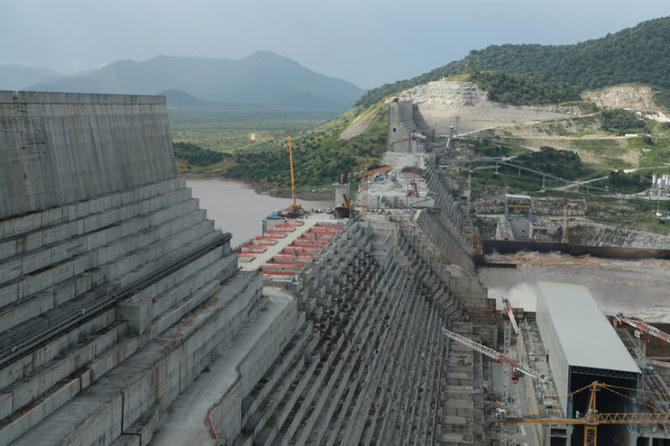BEIRUT: There was a spike in military action in Lebanon after unidentified missiles were launched from Lebanese territory toward northern Israeli settlements for the second time in less than a week.
The Israeli army launched airstrikes on southern Lebanon and targeted Beirut’s southern suburbs for the first time since the ceasefire agreement came into effect on Nov. 27 last year.
Two Israeli missiles hit a building in the densely populated Hadath area, filled with schools, hospitals, and commercial markets, leading to its complete collapse.
The Israeli army claimed in a statement that it had attacked “an infrastructure facility used for storing drones belonging to Hezbollah in Beirut’s southern suburb.”
Residents of Beirut’s southern suburbs were surprised when the Israeli army spokesperson resumed issuing evacuation warnings to locals who had returned to their homes four months ago after the ceasefire.
Chaos swept the Hadath area and its surroundings after Israel identified the targeted building on a map.
Panicked families rushed to schools to pick up their children. Amid the confusion, some children were separated from their parents or lost sight of their siblings.
Between the initial Israeli evacuation warning and the actual airstrike, Israeli drones conducted warning raids over the area.
Three hours after the first warning, the building was struck by Israeli warplanes.
Preliminary reports indicated that the airstrikes wounded one person, while attacks on towns in southern Lebanon killed three people, including a woman, and wounded dozens.
The raids on Beirut, in addition to southern regions, caused widespread confusion that extended to Lebanon’s political leadership.
According to the Lebanese presidency’s media office, President Joseph Aoun was informed of the Israeli threat against Beirut during a meeting in Paris with French President Emmanuel Macron, as well as the Syrian and Cypriot presidents and the Greek prime minister.
The matter was also relayed to the attendees.
In Beirut, Prime Minister Nawaf Salam held a series of calls with Arab and international officials to “exert maximum pressure on Israel to halt its repeated hostilities,” according to his media office.
Israeli newspaper Yedioth Ahronoth reported that “US President Donald Trump had asked Israeli Prime Minister Benjamin Netanyahu not to target the capital, Beirut, or vital facilities, such as the airport, port, and electricity company.”
In a statement, Salam condemned “the renewed military operations on the southern border.”
He contacted Lebanese army chief Gen. Rodolph Haykal, and “inquired about the field developments, requesting swift action to investigate and identify the parties behind the irresponsible rocket launches from Lebanese territory, which threaten Lebanon’s security and stability.”
Salam urged the army chief to "”intensify efforts to track down the perpetrators, arrest them, and refer them to the judiciary.”
He also emphasized the “need to prevent such reckless actions from recurring,” highlighting “the importance of completing the measures taken by the Lebanese army to ensure the State’s exclusive control over weapons.”
Salam reaffirmed Lebanon’s “full commitment to implementing Resolution 1701 and the ceasefire arrangements,” emphasizing that “the Lebanese army alone is tasked with protecting the borders, with the Lebanese state having the sole authority to decide on war and peace.”
Earlier on Friday, the Israeli army announced that it had “detected the launch of two missiles from Lebanon,” saying that “one was intercepted, while the other fell inside Lebanese territory.”
The incident coincided with sirens sounding in the Margaliot, Kiryat Shmona, and Misgav Am settlements.
Last Saturday, six unidentified missiles were fired from Lebanese territory toward the Israeli settlement of Metula, prompting Israel to retaliate by bombing areas north of the Litani River and the Bekaa region.
The UN special coordinator for Lebanon expressed “grave concern over the repeated exchange of fire across the Blue Line within a week.”
The army command urged citizens to “abide by military directives to ensure their safety.”
It described the Israeli attacks as “a blatant and repeated violation of Lebanon’s sovereignty and the security of its citizens, a challenge to international laws, and a flagrant breach of the ceasefire agreement.”
No faction has claimed responsibility for Friday’s rocket launches, mirroring last Saturday’s unclaimed launches.
Hezbollah continues to deny involvement and has underlined its ongoing commitment to upholding the ceasefire agreement.
Hezbollah’s media relations department cited a “responsible source within the organization” who reaffirmed “he party’s commitment to the ceasefire agreement” and denied “any connection to the rockets fired from southern Lebanon on Friday toward northern occupied Palestine.”
The source claimed that “these incidents serve as dubious justification for ongoing Israeli aggression against Lebanon.”
Israeli forces bombarded the town of Khiam with artillery and phosphorus shells, causing a school to catch fire. The air campaign extended across southern Lebanon, hitting Yohmor, Zawtar, Arnoun, the Litani River area, Kfarhouna’s outskirts, Nabaa Al-Tasa, Sojod, and highlands in Iqlim Al-Tuffah and Jbour regions, as well as areas surrounding Arnoun and Kfar Tebnit.
The Lebanese Ministry of Health reported that a single airstrike on a residential building claimed three lives — retired Lebanese Maj. Ali Mahmoud Sharaf Al-Din, his wife, and a displaced woman — and injured 18 people, including three children and eight women. Civil defense teams were searching for more victims.
Yisrael Katz, Israel’s minister of defense, stepped up the inflammatory rhetoric, saying: “If residents of Kiryat Shmona and the Galilee do not experience calm, then Beirut will not know calm either.”
Katz placed “direct responsibility on the Lebanese government for all projectiles fired toward the Galilee,” asserting that “what applies to Kiryat Shmona applies equally to Beirut.”
In a related development, David Azoulay, head of the Metula local council, called for “the Israeli government to formally withdraw from Resolution 1701” and suggested that “if Lebanon’s government refuses to cooperate, Israel should extend military action to target both the Lebanese state and its armed forces.”



























